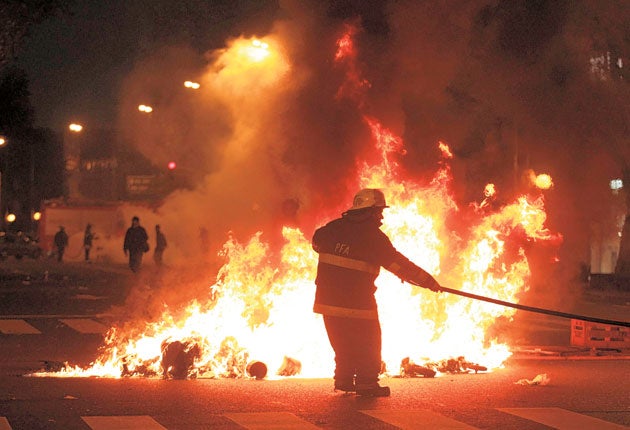Once-mighty River Plate run dry by hooligans
Decline and fall of Argentina's most successful club sparks violence in Buenos Aires. Mark Fleming reports

Daniel Passarella was asked if he would resign from his role as president of River Plate in the aftermath of the relegation of the most successful club in Argentinian football from the country's top flight.
"I will have to be taken from here body in a body bag," Passarella, Argentina's World Cup-winning captain in 1978, told reporters, an unfortunately inappropriate choice of words seeing as in the streets around the Estadio Monumental in downtown Buenos Aires thousands of supporters were rioting in response to seeing their once great team relegated for the first time in its 110-year history.
There were reports that one spectator had died of a heart attack as violence marred the second leg of River Plate's play-off with Belgrano. Hardcore supporters among the estimated 60,000 crowd brought the game to a premature end when they tried to scale fencing and invade the pitch, pushed back only when police fired high-powered hoses at the terraces.
Referee Sergio Pezzotta brought the game to a close on 89 minutes with the score at 1-1, giving Belgrano a 3-1 aggregate win and a place in history, as well as in the Primera Division. The violence soon spread to the streets outside the stadium, where police used horses, water cannons, tear gas and rubber bullets to control rioting fans. The clashes left 68 people injured, 50 arrested and 15 vehicles destroyed, according to the Federal Police. Two officers suffered fractured skulls and 23 others were taken to hospital with various injuries. "We believe there are two officials in grave condition after being hit in the head with stones and other objects hurled at them," a police spokesman said.
The River Plate players and staff needed a heavy police escort before it was safe for them to leave the ground, and contemplate the unthinkable. River Plate are the most successful club in Argentina, nicknamed Los Millonarios (The Millionaires) after they bought a player for £23,000 in the 1930s and paid mostly in gold. They have 33 titles to their name, the last coming just three years ago, under the management of David Beckham's former nemesis Diego Simeone, but are having to face up to life in the National B league, which kicks off again in a month and a half's time.
The humiliation of relegation is compounded by the way the Argentinian league is biased in favour of the established teams. Two short, separate championships are played per year and relegation is worked out on an average of points accumulated over three years, or six championships. This was no blip. Relegation comes at the end of three disastrous years for River Plate, who are £15m in debt and are reputed to be under the control of a powerful hooligan element.
Known as Los Borrachos del Tabon, which translates as "the drunks of the terraces", the hooligans are one of the most dangerous and feared firms in Argentina, a country where the unofficial fans' groups known as "barra brava" can have a significant financial interest in the fortunes of the clubs they follow.
In River Plate's case, this is alleged to include security inside the Estadio Monumental, selling merchandise, and even the buying and selling of players. Their power gathered strength in 2006, when internal divisions sparked a violent war between various leaders that culminated in the murder of the influential Gonzalo Acro in 2007, shot three times as he left a gym. The poisonous influence of Los Borrachos is thought by many to be behind the decline of River Plate; however, they are not the only club in the country to be rotten with hooliganism.
The timing of the trouble could hardly be worse for the Argentinian authorities. The prestigious Copa America starts on Friday in Argentina, and the Estadio Monumental is due to host the final on 24 July, when Argentina are expected to meet Brazil.
Subscribe to Independent Premium to bookmark this article
Want to bookmark your favourite articles and stories to read or reference later? Start your Independent Premium subscription today.

Join our commenting forum
Join thought-provoking conversations, follow other Independent readers and see their replies